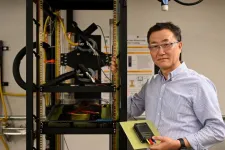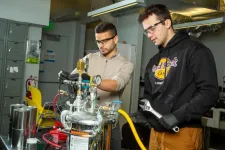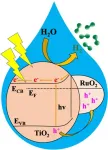(Press-News.org) COLUMBUS, Ohio – A noninvasive colorectal cancer screening test that can be done at home could reduce the risk of colorectal cancer death by 33%, according to a new study published in JAMA Network Open. This is the first study to evaluate this tool’s effectiveness in specific racial groups.
For this study, researchers at The Ohio State University Comprehensive Cancer Center – Arthur G. James Cancer Hospital and the Richard J. Solove Research Institute (OSUCCC – James), and Kaiser Permanente evaluated data from nearly 11,000 patients who underwent at-home FIT (fecal immunochemical testing) among Kaiser Permanente’s members in Northern and Southern California between 2002 and 2017. Kaiser Permanente has one of the largest at-home screening programs in the United States and has been a leader in implementation of at-home colorectal cancer screening to increase overall screening guideline compliance and improve racial disparity gaps.
“The right screening test is the one that gets done – and is done well. Although we have known for decades that colorectal cancer can be caught in its earliest, precancerous state through screening, only about 60% of Americans 45-75 years old are up to date with screening. This is a tragedy because we could save many more lives by making screening more accessible through non-invasive screening methods like FIT,” said Chyke Doubeni, MD, MPH, senior author of the study. Doubeni serves as chief equity officer at the Wexner Medical Center, associate director of diversity, equity and inclusion at the OSUCCC – James and professor at The Ohio State University College of Medicine.
He said some people may not get screening coloscopy due to fear or embarrassment, which results in many people being diagnosed with the disease at more advanced, less treatable stages.
“The evidence shows that FIT done every year is as good as getting a colonoscopy every 10 years for screening people of average risk. This study should give individuals and their clinicians the confidence to use this noninvasive test for screening and find ways to deploy these tests in underserved communities where colorectal cancer screening rates are very low,” said Doubeni.
He notes, however, that it is critical that anyone with a positive test to not delay getting a colonoscopy to follow up on an abnormal FIT result. Screening colonoscopy is a procedure where a thin tube with a tiny camera tip is inserted in the rectum to view the intestinal lining. Precancerous polyps can then be removed at the time of the procedure and early cancers are treated before getting to advance stage. FIT involves a stool sample that is collected at home and mailed to the laboratory where it is tested.
Study design and methods
For this new study, researchers evaluated information from 10,711 people who completed a FIT screening for colorectal cancer screening. Patients between the ages of 52 and 85 were identified across multiple medical centers between 2002 and 2017.
In addition to reducing the risk of colorectal cancer-related death by 33%, researchers observed a 42% lower risk for cancers occurring on the left side of the colon inclusive of rectal cancers. FIT screening was also associated with lower risk of colorectal cancer death among non-Hispanic Asian, non-Hispanic Black and non-Hispanic White people.
“Colorectal cancer screening works and is one of the best ways of decreasing deaths from colorectal cancer,” said Douglas Corley, MD, PhD, a co-principal investigator and the chief research officer from Kaiser Permanente, Northern California. “This study, of at least one FIT screening in the last few years, confirms this method is an effective tool. It can be performed at home, and we anticipate that regular, annual use, as recommended, can result in even larger reductions in cancer deaths over time. In our setting, providing multiple methods for cancer screening has increased participation to over 80%, which has been associated with approximately a 50% reduction in colorectal cancer deaths.”
Increasing access to at-home testing
The Wexner Medical Center and the OSUCCC – James launched a pilot program to provide at-home colorectal cancer screening tests that is now also offered in the primary care clinics. The program is a first step in broader implementation to increase to screening.
According to the American Cancer Society, Black patients are 20% more likely to be diagnosed with colon cancer and 40% more likely to die of the disease compared to non-Hispanic white patients. People in the Appalachian region also have disproportionally high rates of death from colorectal cancer.
Collaborators in the National Cancer Institute-funded study include Douglas Corley, MD, PhD, Christopher Jensen, Theodore Levin, MD, Nirupa Ghai, PhD, Kimberly Cannavale, Wei Zhao, Kevin Selby, Skye Buckner-Petty, MPH, Ann Zauber, PhD, Robert Fletcher, MD, Noel Weiss, MD and Joanne Schottinger, MD.
To learn more about screening and care at the OSUCCC – James, visit cancer.osu.edu or call 1-800-293-5066.
###
END
New study shows at-home colon cancer screening test reduces risk of colorectal cancer death, as effective as screening colonoscopy
2024-07-25
ELSE PRESS RELEASES FROM THIS DATE:
A cool solution
2024-07-25
Artificial intelligence (AI) is hot right now. Also hot: the data centers that power the technology. And keeping those centers cool requires a tremendous amount of energy.
The problem is only going to grow as high-powered AI-based computers and devices become commonplace. That’s why University of Missouri researcher Chanwoo Park is devising a new type of cooling system that promises to dramatically reduce energy demands.
“Cooling and chip manufacturing go hand-in-hand,” said Park, a professor of mechanical and aerospace engineering in the Mizzou College of Engineering. “Without proper cooling, components overheat and fail. Energy-efficient data centers will be key ...
Electrical currents may make body’s cancer-killing cells even better killers
2024-07-25
Scientists have discovered that electrical currents may make Natural Killer (NK) cells – our very own cancer-killing immune cells – even better killers, which could have significant implications for treating some cancers.
The scientists found that Tumour Treating Fields (TTF) in the laboratory (which mimic exposure of brain tumours to electric currents via a simple hat worn by patients) evoked an even more deadly response from NK cells. They hope their promising findings may open the door to new combined therapies for people living with certain brain tumours, such as glioblastoma.
Glioblastoma is an aggressive, common ...
In Illinois, ‘older adults are at increased risk for suicide’
2024-07-25
Most (83%) suicide deaths were among men
Firearms were the most frequently used weapon (59%)
Among those who died by suicide, 20% had been diagnosed with depression; only 14.1% of them were receiving treatment
CHICAGO --- Nearly 20% of suicides in Illinois between 2020 and 2021 were among people 65 years and older, according to recently released data from Northwestern University Feinberg School of Medicine. The suicides disproportionately affected white men between the ages of 65 and 74 years, with ...
Raindrops grow with turbulence in clouds
2024-07-25
Scientists for decades have attempted to learn more about the complex and mysterious chain of events by which tiny droplets in clouds grow large enough to begin falling toward the ground. Better understanding this process, known as the “rain formation bottleneck,” is fundamental to improving computer model simulations of weather and climate and ultimately generating better forecasts.
Now a research team led by scientists at the U.S. National Science Foundation National Center for Atmospheric Research (NSF NCAR) ...
Penn researchers reveal how a bacterium supports healing of chronic diabetic wounds
2024-07-25
PHILADELPHIA – There are many important reasons for keeping cuts and sores clean, but new research from the Perelman School of Medicine at the University of Pennsylvania shows that a certain bug, Alcaligenes faecalis (A. faecalis), can facilitate healing of hard-to-treat wounds among people with diabetes. While there are many studies done on potentially harmful bacteria in wounds, the researchers discovered that A. faecalis, a bacterium found in many types of chronic wounds, actually boosts healing of diabetic wounds. The researchers found that the beneficial bacterium can promote ...
A recipe for zero-emissions fuel: Soda cans, seawater, and caffeine
2024-07-25
A sustainable source for clean energy may lie in old soda cans and seawater.
MIT engineers have found that when the aluminum in soda cans is exposed in its pure form and mixed with seawater, the solution bubbles up and naturally produces hydrogen — a gas that can be subsequently used to power an engine or fuel cell without generating carbon emissions. What’s more, this simple reaction can be sped up by adding a common stimulant: caffeine.
In a study appearing today in the journal Cell Reports Physical Science, the researchers show they can produce hydrogen gas by dropping pretreated, pebble-sized aluminum pellets into a beaker ...
Study suggests preoperative iron infusions work better than blood transfusions for some anemic patients
2024-07-25
In a rigorous medical records study covering tens of thousands of patients, Johns Hopkins Medicine researchers conclude that some patients with preoperative anemia have better outcomes if they get iron infusions before surgery rather than standard red blood cell transfusions.
The findings, published July 22 in Anesthesia & Analgesia, contribute to mounting evidence that such iron infusions, which boost the production of a person’s own red blood cells, are better than relying on someone else’s blood.
“Anemia ...
UH engineer develops technique that enhances thermal imaging and infrared thermography for police, medical, military use
2024-07-25
A new method to measure the continuous spectrum of light, developed in the lab of University of Houston professor of electrical and computer engineering Jiming Bao, is set to improve thermal imaging and infrared thermography, techniques used to measure and visualize temperature distributions without direct contact with the subject being photographed.
Because they are highly sensitive, thermal cameras and infrared thermometers measure temperature accurately from a distance, making them versatile and valuable tools in many fields from the military to medical diagnostics. They detect infrared radiation, ...
Cancer drug could ease cognitive function for some with autism
2024-07-25
An experimental cancer drug could make thinking easier for individuals with Rett syndrome, a rare disorder linked to autism, according to new research from the University of California San Diego — a discovery that could lead to therapies for patients with other neurological conditions.
The findings, published July 25 in Stem Cell Reports, highlight the role of microglia — a type of white blood cell found in the central nervous system — in the formation of the human brain.
While such cells have been better studied in neurodegenerative disorders like Alzheimer’s disease, amyotrophic ...
Oregon State University research uncovers better way to produce green hydrogen
2024-07-25
CORVALLIS, Ore. – Researchers at Oregon State University have developed a material that shows a remarkable ability to convert sunlight and water into clean energy.
A collaboration led by Kyriakos Stylianou of the OSU College of Science created a photocatalyst that enables the high-speed, high-efficiency production of hydrogen, used in fuel cells for cars as well as in the manufacture of many chemicals including ammonia, in the refining of metals and in making plastics.
The findings represent a potential new tool to use against greenhouse gas emissions and climate change, said Stylianou, whose research focuses ...




